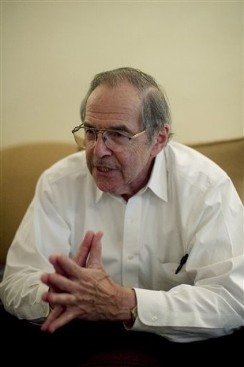US confirms it is looking into unilateral intervention to deliver aid in Sudan
January 24, 2012 (KHARTOUM) – A senior United States official confirmed on Tuesday that the Obama administration could end up pushing aid into two border states in Sudan facing the prospects of famine, if Khartoum does not allow full access.

Despite international appeals from the US, UN and the European Union (EU) the Sudanese government initially refused to grant permission for aid agencies to enter the rebel areas. Over the weekend however, Khartoum softened its stance saying it will allow extremely limited access to humanitarian agencies and with many conditions imposed.
Sudan Armed Forces (SAF) and SPLM-N have been fighting battles in parts of these two states since last year causing displacement of thousands of people.
The US special envoy to Sudan, Princeton Lyman, told reporters that the crisis could expand to more than a quarter of a million people.
The violence has already forced about 417,000 people to flee their homes, more than 80,000 of them to South Sudan, the United Nations estimates. Locals have faced air raids and sporadic ground fighting, according to rights groups and refugees.
“This could be a major, major calamity,” Lyman said according to Reuters.
He suggested that Washington is waiting to see what the outcome of the upcoming African Union (AU) summit would be before deciding what the next course of action would be.
“We are feeling a lot of pressure, if there’s no international access, to look at ways in which assistance would be carried across the border without their approval,” Lyman warned.
“If you want to do something by March considering positioning of food, etc, it takes quite a while …. so if the (AU) meeting doesn’t resolve this by the end of January we’re going to be in a serious situation”.
But the US official acknowledged that any move could face backlash and therefore no decision has been made yet.
“We know that the [Sudanese] government would be opposed to it,” he said.
US Deputy Secretary of State, Bill Burns, will head to Ethiopia for the January 29-30 AU summit, where he is expected to press for a strong regional response to Sudan’s emerging food crisis.
Aid experts said the US had limited options if Khartoum maintains its ban on aid, and voiced concern that existing aid operations in the troubled western region of Darfur could be targeted for reprisals.
“Air drops are not really viable because the cost versus scale is really high,” one aid group analyst, speaking to Reuters on the background due to the sensitivity of the situation.
“It could be that they have some idea of what they want to do and are just not sharing it, but certainly the operational NGOs do not have a clear picture of what the plan is”.
The Sudanese government has warned against unilateral intervention by the US and stressed that any aid delivery should be done in coordination with Khartoum.
A political analyst in Khartoum told Sudan Tribune that he is surprised that the report on US plans did not generate “the usual angry response” by the government when it feels threatened by foreign intervention.
In Khartoum the interim U.S. charge d’affaires Mary Yates met with the minister of social welfare Amira al-Fadil to discuss the issue of delivering aid to those affected in South Kordofan and enlisting help of UN agencies in this regard.
Al-Fadil reiterated to Yates that the humanitarian situation in the region has stabilised adding that the government has started implementing the directives issued last week by the foreign ministry and the Humanitarian Assistance Commission (HAC).
She revealed that Khartoum allowed World health Organization (WHO), United Nations Children’s Fund (UNICEF) and World Food Programme (WFP) along with HAC will carry out a field assessment in the state using Sudanese staff starting next week to reflect the “reality” of the situation.
Al-Fadil said that any assistance that needs to be provided and distributed will be done so by national and international partners.
(ST)
